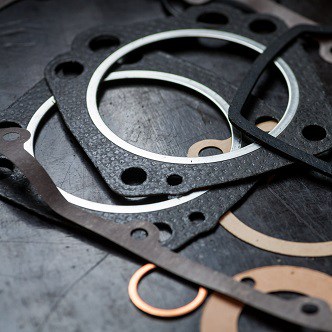 Silicone gaskets offer resistance to corrosion, water, ozone, and UV as well as superior performance in high and low-temperature environments. These durable, flexible, and temperature-resistant seals are used for a wide variety of applications within aviation, construction, and other industries to provide a solution to fluid leakage.
Silicone gaskets offer resistance to corrosion, water, ozone, and UV as well as superior performance in high and low-temperature environments. These durable, flexible, and temperature-resistant seals are used for a wide variety of applications within aviation, construction, and other industries to provide a solution to fluid leakage.
At Fournier Rubber, we have been delivering high-quality rubber solutions since 1933. Contact us to learn more about our silicone gasket solutions, or request a quote to start your order.
Features of Silicone Gaskets
Silicone gaskets are known for their versatility and temperature stability. They are available in solid, sponge, and foam silicone types. While solid silicone gaskets are ideal for creating a seal around metal surfaces, sponge and foam silicone gaskets are suitable for applications where minimal force is necessary to create a seal.
Silicone is highly compressible and remains flexible at low temperatures. It will not shrink over its lifetime due to temperature fluctuations and is not affected by UV rays or ozone. Silicone gaskets also offer optimal waterproofing and are resistant to a wide range of substances.
Applications of Silicone Gaskets
Silicone’s desirable mechanical properties make it ideal for various indoor or outdoor settings that are exposed to harsh conditions. Industries and applications that rely on silicone gaskets include:
- Aviation. Silicone’s resistance to high and low temperatures makes it ideal for sealing vital aviation components like fuel lines, doors, and ventilation ducts.
- Consumer Products. A variety of consumer appliances depend on the temperature stability and waterproof properties of silicone gaskets.
- Construction. Silicone is used in various construction projects to protect buildings from pollution, water, heat, and wear-related damage without changing their appearance.
- Electronic Products. Silicone gaskets prevent water, heat, and corrosion from damaging the internal components of electronic devices.
- Healthcare. Silicone’s resistance to bacteria and moisture makes it ideal for medical applications such as prosthetics and various medical equipment.
Benefits of Silicone Rubber
Silicone rubber is an advantageous material for high-performance gaskets in various applications. Benefits of silicone gaskets include:
- Thermal stability. Compared to other elastomers, silicone remains flexible in both high and low-temperature environments while retaining its shape and durability.
- Versatility. Silicone is extremely versatile and can come in wide range of forms and shapes to meet various specifications. Silicone is also receptive to formula alterations, allowing for enhanced flexibility, toughness, and electrical resistance properties.
- Environmental resistance. Silicone gaskets are ideal for outdoor applications and other harsh conditions. They can withstand extreme temperatures, flames, UV rays, and corrosion.
- Moisture sealant. Silicone creates an excellent seal with its malleability and water repellent properties.
Types of Gaskets
Silicone gaskets are one of several gasket types that suit a diverse range of applications. Common types of gaskets include:
- Silicone. Silicone gaskets are a high-performance variety of rubber gaskets suitable for outdoor environments. They deliver ideal performance in high and low temperatures along with resisting damage from UV and ozone.
- Cork. An uncommon material today, cork gaskets are the oldest form of mechanical leak stops. They are more expensive than modern options but were once the strongest and most prevalent gasket material available.
- Rubber. There are three primary rubber gasket materials: EPDM, silicone, and chloroprene. While each material has its advantages and disadvantages, rubber gaskets remain one of the most prevalent modern gasket materials.
- Metal. Metal gaskets are the preferred material for high heat applications due to their ability to expand as temperatures rise. Metal also has excellent longevity.
- Glass. Glass is a reliable gasket material for applications involving inert gas, hot water, mild acids, or alkaline where the fluids remain below 600 °F with pressures under 1,200 PSI. Glass gaskets can withstand hazardous conditions without cracking when precisely engineered.




